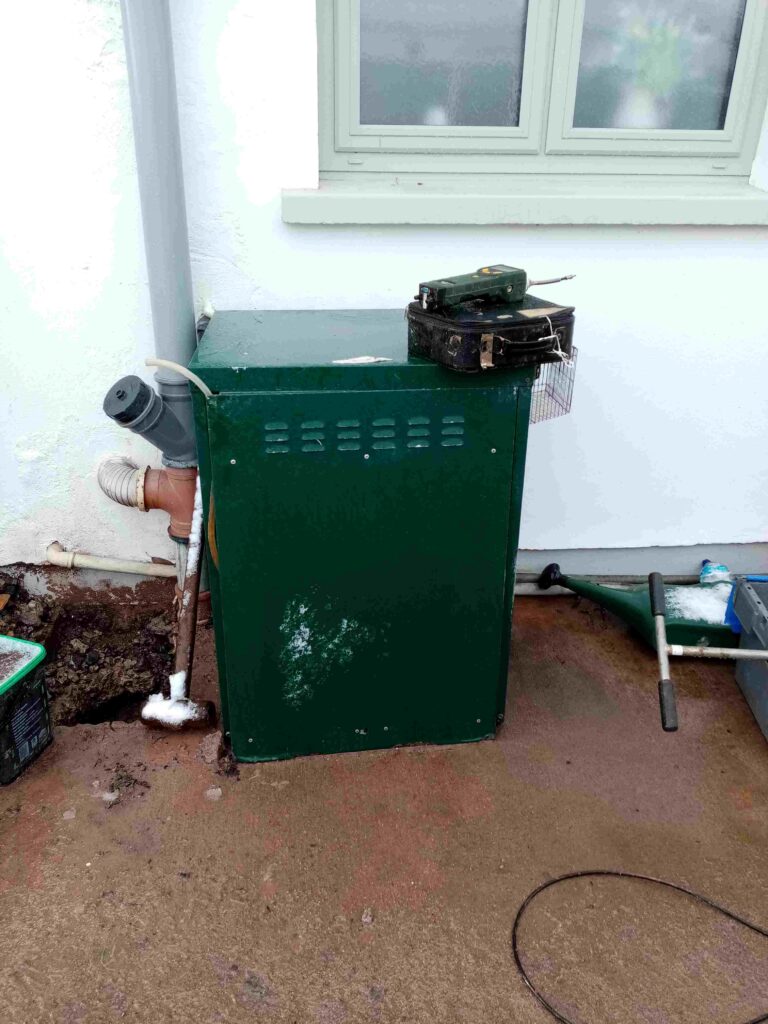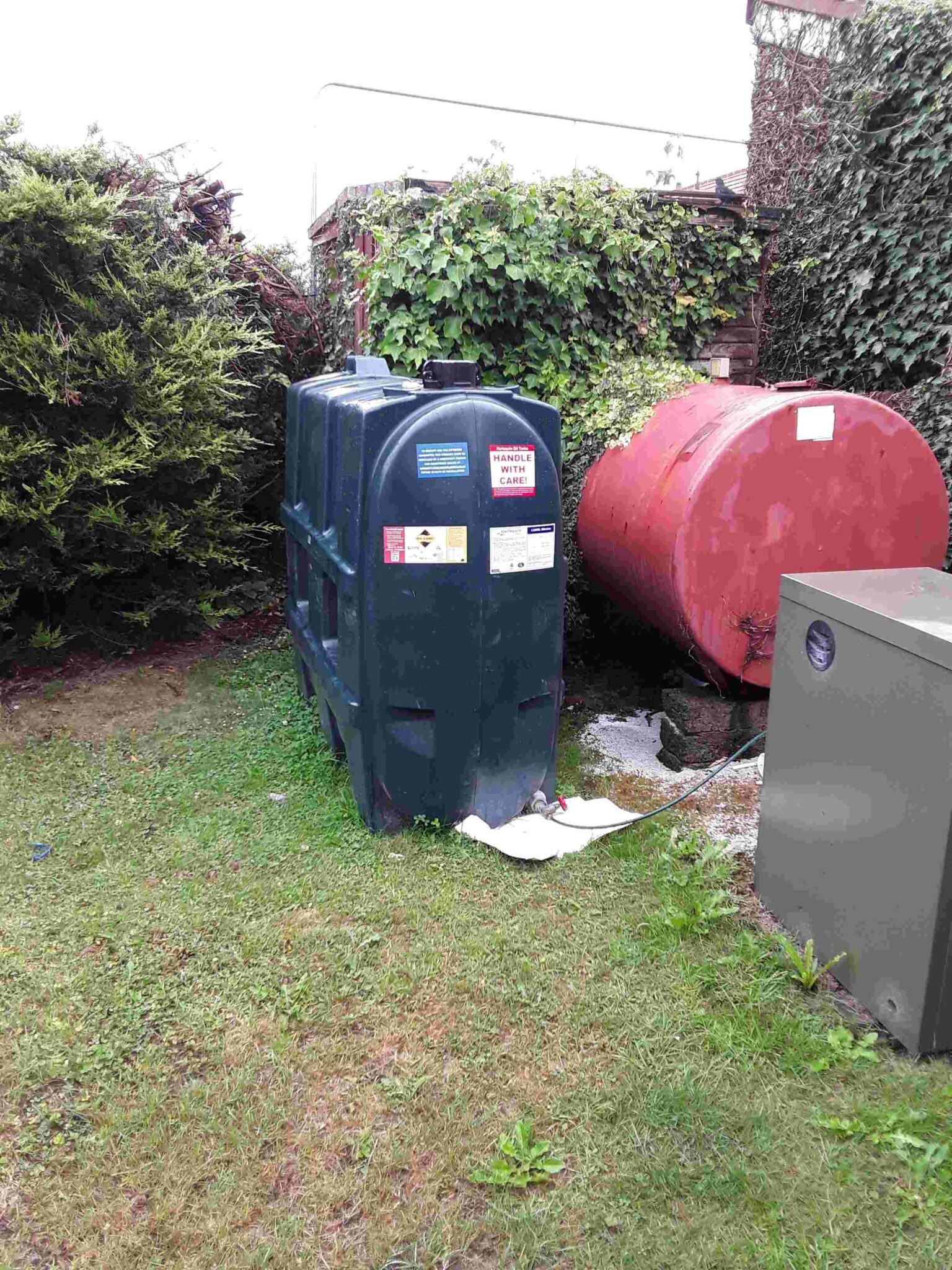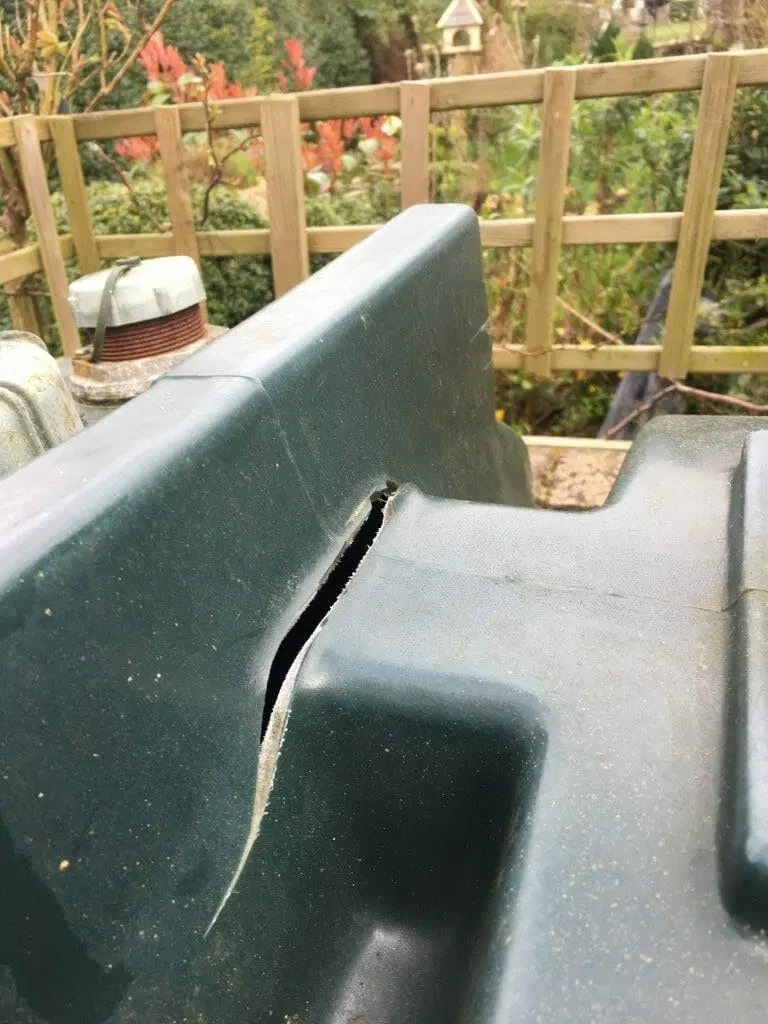What Happened
An oil leak at a boiler in Ballymena resulted in an unknown quantity of home heating oil escaping.
The customer began to notice a strong oily odour in their kitchen growing in strength over a few days.
Originally, it was suspected that some of the products under the sink was to blame, but as the odours worsened the customer broadened their investigation to the boiler.
A drip was noticed from the burner unit (covered in a red plastic box)
The customer found Gaea via Google and our website and called us for advice.
We were bale to talk the customer through how to turn the oil supply off at the tank, preventing any more oil from escaping.
Investigation
- An investigation was booked by the customer for the following day.
- The source of the leak was found to be a failed flexi-hose.
- Our staff conducted a drilled borehole survey across the work area following by a trial pit survey.
- A detailed report was compiled and our initial report was made available within three days.
- The customer asked us to speak to their insurance company on their behalf ass they were quite anxious.
- Ordinarily we wouldn’t get involved in this, but it turns out that the insurer and adjuster were people we deal with on a daily basis and they were glad to hear from us on this project, rather than other contractors.
what we found
- We found that the kerosene had penetrated the concrete below the boiler very easily as it is porous and impacted the stones below the concrete yard.
- The soil vapour survey where drilled boreholes were advanced into the aggregate below the concrete gave us a really good idea of where the oil would be.
- But further confirmation was required, trial pits were cut into the concrete and our staff excavated the pits down to foundation level.
- The trial pits also showed us that perched groundwater was prevalent at the property. The kerosene was sitting on the water and spreading across site on its surface.
- This allowed us to confirm the presence of oil or rule out areas that were just a result of fumes.
- A Vapour Extraction Unit (VEU) was installed to manage odours.
- A very site specific remedial plan was put together. Gaea always try to propose the most efficient remedial program based on not just cost, but sustainability, turnaround and convenience to the customer
Remedial works
Once approved by the customer insurance company we arrived at the property to start works two days later!
The boiler was relocated and connected else where on site. The customers only lost heating for a few hours.
Impacted areas of concrete yard were broken out with a breaker and placed in a skip.
The underlying aggregate was excavated to clean clay and the spoils removed and placed in lined skips for recycling.
The trial pit investigation revealed significant perched groundwater across the site, an Oil Water Separator (OWS) and Granulated Activated Carbon (GAC) unit were brough to site and used to recover and treat the perched groundwater, removing both the visible oil from the surface in addition to those invisible dissolved contaminants that can’t be seen.
Validation
- The treatment continued until the water sample testing confirmed that the perched groundwaters were as clean as clean can be (below the level of detection of the laboratory).
- Five soil samples were taken from the walls and base of the excavation and were then sent to a UKAS accredited laboratory for analysis.
- A single air quality sample was also analysed to confirm that the indoor air quality were well below all recognised indoor air quality thresholds.
- A detailed validation report was prepared and made available to the customer and their insurance company within two days of receiving the results from the laboratory.
Reinstatement
Any services in the vicinity such as sewers and storms drains were tested and any necessary repairs made.
The excavation was backfilled with aggregates compacted in layers not exceeding 225mm.
The area of removed concrete was then squared off with a concrete saw and made neat and tidy.
The concrete was repoured and left with a finish to match the existing surrounding surfaces.
The boiler was then relocated to its original position where it was recommissioned and serviced.
Turn around - savings
- Gaea took an out of hours call at 8pm and provide advice and instructions on how to prevent further loss of oil.
- An investigative team attended then next morning, fixed the leak and conducted a full, thorough investigation.
- Our report was available within three days.
- Works started on site two days after Insurance company approval.
- The excavations involved the removal of three skips of material were completed in 1.5 days. All waste was recycled rather than being sent to landfill.
- Treatment went on for a week before samples were sent to the laboratory and a further week as an insurance policy whilst waiting for results.
- Reinstatement took one day for the civils and a further half day for the OFTEC (boiler) works.
- Prompt attendance, installation of pumps in the perched groundwaters controlled any further migration, reducing potential costs.
- The customer was delighted and even gave us a five star Google review.
If you suspect that you have an oil spill or are at risk of one please get in contact ASAP.
The sooner you can get the leak stopped, contained and assessed the smaller job it will be. Contact Gaea directly on 08000 541 361 or 012330222 for ROI


